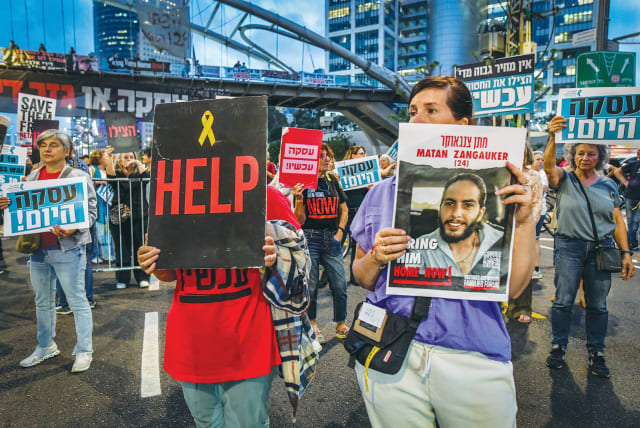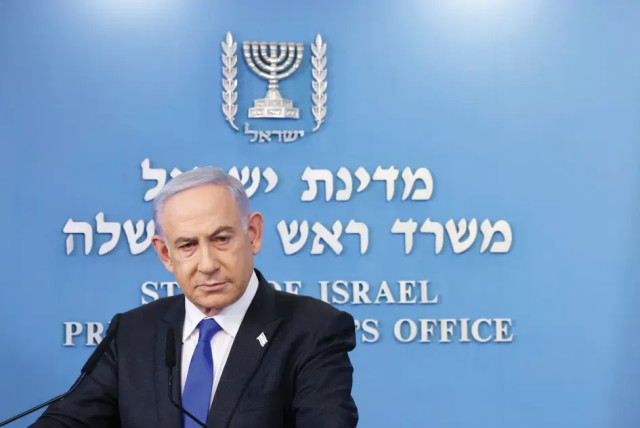Threatening hostage families is a new low for Israel's government - comment

Broad Perspective: The choice to focus on military achievements on the ground in Gaza instead of hostages is dehumanizing for the hostages, as they stagger down Israel’s list of priorities.
The Israeli government has allegedly been threatening the families of the hostages that Hamas took into Gaza on October 7.
At first, it sounded like a conspiracy theory. After all, who would ever threaten those who had their loved ones – some sick, some injured – torn from them into enemy land and held hostage for over half a year?
However, officials surrounding the hostage families have revealed that the government has repeatedly threatened that those among them who vocally oppose the government too much will see their relatives lowered in priority in any future hostage deal.
The crooked thing about this, of course, is that the government does not want a hostage deal. It would harm their already-dwindled base of right-wingers looking for a hard stance within the context of the Israel-Hamas war.
When Ronen Tzur, former head of the Hostages and Missing Families Forum, was interviewed by The Jerusalem Post’s Eliav Breuer and Tovah Lazaroff, he told them that while the forum is a nonpartisan organization, the government tried to repaint it as a political movement targeting Prime Minister Benjamin Netanyahu.
According to Tzur, the government saw the forum as a threat and a nuisance, as any hostage deal would involve paying heavy prices and could hurt Netanyahu politically.
Government members warned hostage families
In February, he said, hostage families told him that government members were warning them that they better remove him from the forum leadership; others said they were told that if they did not lower the public pressure, their loved ones might not be on the lists of released hostages in future deals.
Israeli media personality Jacky Levy, who has three relatives currently held captive in Gaza, told Channel 13 this week that “official spokespeople” of the government spoke to hostage families and “told them that whoever does not support this government will move down to unpleasant places in the [hostage exchange] list.”
For a long time now, hostage families have been “concerned” over what would happen to “anyone who says anything against Netanyahu, against how the government is operating,” Levy said.
Then, on Wednesday, Settlements and National Missions Minister Orit Strock told Army Radio that the government was “throwing the [war effort] into the trash to save 22 or 33” of the 133 hostages being held by Hamas in Gaza.
One thing is consistently being made clear by this government: The hostages are not the top priority, and perhaps – even when the politicians and ministers said the hostages were the most important thing – they never were.
True, a hostage deal would mean significant losses on the Israeli side. To bring them home, we would have to give up a lot. But these losses are precisely what we have been arguing for this entire time, because they, “the enemy,” honor death the way we honor life. It is time for us to keep our word and honor life.
The choice to turn away from this goal and instead focus on military achievements on the ground in Gaza is dehumanizing for the hostages, as they stagger down Israel’s list of priorities.
Ultimately, the government made a mistake. It turned the issue of a hostage-exchange deal into a partisan argument. This resulted in the loss of a significant portion of its right-wing base, which values the lives of those taken from us, and demonstrated to the world that Israel’s government does not appreciate the very losses it cites as justification for the operation in Gaza.
We cannot argue that the world does not care about our hostages if we do not show that we ourselves care for them.
The writer is deputy editor-in-chief of The Jerusalem Post.
Jerusalem Post Store
`; document.getElementById("linkPremium").innerHTML = cont; var divWithLink = document.getElementById("premium-link"); if (divWithLink !== null && divWithLink !== 'undefined') { divWithLink.style.border = "solid 1px #cb0f3e"; divWithLink.style.textAlign = "center"; divWithLink.style.marginBottom = "15px"; divWithLink.style.marginTop = "15px"; divWithLink.style.width = "100%"; divWithLink.style.backgroundColor = "#122952"; divWithLink.style.color = "#ffffff"; divWithLink.style.lineHeight = "1.5"; } } (function (v, i) { });

